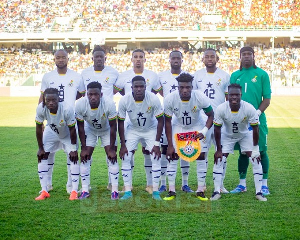He said the New Patriotic Party (NPP) administration has been able to, through the use of appropriate fiscal and monetary policies, maintain the macroeconomic stability achieved last year, albeit at great political cost.
Mr. Osafo-Maafo mentioned some of the challenges as: higher than expected payments of wages and salaries (especially to teachers and doctors);
an acceleration in the payment of arrears incurred in previous years to suppliers of goods and services, including road contracts;
payment of arrears to the Social Security and National Insurance Trust (SSNIT);
higher than expected programmed subsidies to utility companies including the Volta River Authority (VRA);
a substantial shortfall in foreign inflows; lower than expected divestiture receipts; and external shocks resulting from higher world prices of crude oil.
Against the backdrop of these potentially costly developments, overall total domestic expenditures for January through July 2002 were only slightly above target (0.6 per cent of GDP). Domestic revenue generation has, however, been quite robust, exceeding the programme targets by 1.3 per cent GDP.
According to the Finance Minister, the provisional over all cash deficit (3.6 per cent of GDP), for the same period was 1.2 per cent of GDP, below the programme target of 4.8 per cent of GDP, while the primary balance target of 0.8 per cent of GDP was exceeded by 0.7 per cent of GDP.
Because of the substantial shortfalls in foreign inflows (5.1 per cent of GDP), the Ghanaian government has had to borrow more (2.4 per cent GDP) from domestic sources than anticipated.
In order to contain the potentially adverse effects of excessive domestic financing, monetary policy has been adjusted, through an intensification of Open Market Operations (OMO) to ensure that macroeconomic stability stays on course.
According to the review, inflation has remained on a downward trend, recording 12.9 per cent in September 2002, as compared to end year target of 13 per cent.
The Finance Minister told the House that, “as is to be expected, the effects of these fiscal developments have been transmitted to the foreign exchange market”. Between January and June 2002, the cedi had depreciated by 10.8 per cent and 17.0 per cent against the pound and euro respectively. “This must, however, be viewed in the context of the high appreciation of the Euro against the dollar” – the major trading currency for Ghana, Mr. Osafo-Maafo said.
On the structural front, the minister said, substantial progress has been made in the Public Financial Management Reform Programme (PURMARP). A number of measures have been taken by the Ministry of Finance with respect to resource mobilisation, public expenditure monitoring and financial management. The Ministry of Finance considers Public Finance Management critical to overall economic governance and therefore making special efforts to get the Phase II of the PURMARP programme started.
In order to mobilize financial resources for government, a non-tax revenue unit has been established to facilitate the collection, accounting, reporting and monitoring of Internally Generated Funds (IGF); and the programme of action for the creation of Large Tax Payers Unit (LTU) is on course to be operational by early 2003.
Ghana would be guided by the experiences of other African countries such as Rwanda, Tanzania, Kenya and Uganda.
The minister told the House that, the government is committed to achieving its overall macroeconomic targets for the fiscal year 2002.
Consequently, appropriate corrective fiscal measures, including intensified revenue administration as well as expenditure reductions will be taken to contain the fiscal situation.
For instance, Ghana has recently sold 25 per cent of its shares in Cocoa Processing Company (CPC) on the Ghana Stock Exchange. There are also plans for the divestiture of other enterprises and it is hoped that by the end of the year, the total inflows will reach the programmed receipts of US$50 million.
In addition, with the recent upward adjustment in utility tariffs and a further adjustment expected in March next year, government says it will soon eliminate the negative budgetary effects of subsidies to utility companies.
With respect to the oil shock, the risks still remain. The inability of the Ghanaian government to adjust the prices of petroleum products in a timely manner to world market conditions, has led to an accumulation of huge financial losses to the Tema Oil Refinery (TOR). This trend is clearly unsustainable and must sooner or later be addressed.
The government says it will continue to monitor developments on the world market and take appropriate measures when necessary. At the moment, it is estimated that government is offering a subsidy of about ?25 billion per month to support users of private and commercial vehicles, a situation which is clearly not sustainable.
Ghana reached the decision point under the enhanced HIPC initiative in February this year and is expected to benefit from a total debt relief of US$273.06 million during the year.
As at October this year, the HIPC main account had been credited with an amount of exceeding ?400 billion. Subsequently, government has approved over ?117 billion for disbursement to various District Assemblies.
Total Receipts
Overall, performance in revenue generation has been satisfactory largely due to improvements in tax administration. Total revenue and grants for the period were ?5,877 billion compared to the target of ?616.6 billion. Total revenue (tax and non-tax revenue) was ?5,028.9 billion, showing a significant over-performance of indirect taxes broadly on target amount of ?4,406.8 billion.
With both direct and indirect taxes broadly on target, the finance minister said over-performance in total revenue is largely attributable to higher than expected receipts from international trade taxes. The actual receipts for import duties and import VAT were ?828.2 billion and ?811.1 billion respectively. This compares with programmed amounts of ?699.7 and ?728.8 respectively.
External Debt
Ghana’s external debt, including obligations to the IMF, was US$6,203.60 million at the end of June 2002, which was US$166.02 million lower than the level at the end of December last year.Medium-term debt went up by US$42.20 million to US$511.29 million. This was as a result of an increase of US$79.30 million in outstanding obligations to the IMF. Debt owed to IMF at the end of June 2002 stood at US$362.90 million.
Long-term debt, on the other hand, increased by US$21.78 million to US$5,622.31 million from December 2001 to June 2002. The long-term debt was made of US$4,016.09 million owed to multilateral institutions and US$1,606.22 million to bilateral creditors. The long-term debt at the end of the review period constituted 90.63 per cent of the total debt.
Govt Mute on IFC Loan
The finance minister did not brief the House on the controversial $1 billion IFC loan, to the disappointment of the minority side of the House which shouted IFC, IFC, IFC.However, in a sharp response to the review, minority spokesman on finance, Moses Asaga told a hurriedly arranged press conference that the economy is not on track as stated by the minister, but rather “fragile”. He accused the government of gross mismanagement of the economy adding, its professed “Golden Age of Business” is a mirage.
According to Mr. Asaga who equipped himself with a lot of documents before addressing the press, the government overdrew its accounts at the Bank of Ghana by a whooping 2 trillion cedis after it lambasted is predecessor, the NDC of overdrawing an amount of ?900 billion.
Mr. Asaga said Ghana’s programmes with the Bretton Woods institutions – the IMF and the World Bank have been terminated because the government missed most of its targets. He added that the financial situation of the government is worse than what happened in 1999/2000.
















